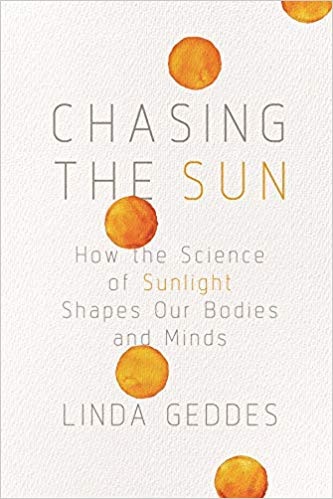 Linda Geddes (Bumpology) illuminates the importance of one singular star in our human lives with Chasing the Sun: How the Science of Sunlight Shapes Our Bodies and Minds. The sun is life: allowing photosynthesis, warming the earth, providing solar power--it's no wonder humans have long worshipped it. We have "assimilated starlight into the very fabric of our beings."
Linda Geddes (Bumpology) illuminates the importance of one singular star in our human lives with Chasing the Sun: How the Science of Sunlight Shapes Our Bodies and Minds. The sun is life: allowing photosynthesis, warming the earth, providing solar power--it's no wonder humans have long worshipped it. We have "assimilated starlight into the very fabric of our beings."
People have resorted to the sun for medical purposes since early times, as well, and it is health and wellbeing that concerns Geddes in this lively, enlightening study. Circadian rhythms, her research reveals, are vital to many aspects of human life, governing blood pressure, body temperature, alertness, immune reactions, sleep cycles and quality and much more. "Almost half of our genes are under circadian control, including ones associated with every major illness investigated so far--including cancer, Alzheimer's disease, type 2 diabetes, coronary artery disease, schizophrenia and obesity." Shift work has recently been recognized as a probable carcinogen. In other words, the importance of sunlight to human existence can scarcely be overstated.
For this thoroughly researched investigation, Geddes consults history, international medicine, chronobiologists and NASA. She's learned we get far too much artificial light and too brightly at night, while daytime interior lighting in most homes and offices is not nearly bright enough to simulate the sun's power over our bodies. She also outlines light therapies for mental health issues, as well as for tuberculosis, and the special struggles and successes of populations at high latitudes, like Iceland. She speaks with fascinating people, like the man with non-24-hour sleep-wake disorder and the woman whose grandmother stuck to a strict meal schedule well into her 90s, and she visits the German "Chronocity" of Bad Kissingen, which advertises itself as "a place where internal time is as important as external time, and sleep is sacrosanct."
While helpful to those interested in seasonal affective disorder or jet lag, this journey to the sun and back will certainly expose any reader to new concerns and marvels as well. Chasing the Sun offers many sobering lessons (sunlight and sleep cycles are life-and-death issues) and helpful tips (the utility of melatonin and vitamin D, and the importance of putting down that smartphone at least 30 minutes before bedtime). Geddes's hopes for using what she's learned, however, lean toward technological advances, not a return to older ways. This is also a riveting read, filled with characters, places, anecdotes and histories sure to fascinate. Geddes brings a sense of wonder to her work that is infectious, and makes scientific and medical concepts easy to understand through simple, serviceable prose. Caution: Chasing the Sun may inspire readers to try eating by candlelight and waking with the sun. --Julia Kastner, librarian and blogger at pagesofjulia
Shelf Talker: This broad study of the sun's power over humankind, even in an age of electric lights and bright screens, is both absorbing and potentially life-changing.
 "Every store I've visited on book tour has its own unique culture, but at every one I have felt at home. All the booksellers felt like old friends, and all their customers, too. In those stores, readers have waited patiently in line for me to sign their books. They have grasped my hands and told me their own stories of love and loss, their own stories of heart-lifting encounters with nature, believing I would understand. I always do. Whether a bookstore is in Tennessee or Pennsylvania, Georgia or New York, Alabama or Illinois, the people I meet there are family....
"Every store I've visited on book tour has its own unique culture, but at every one I have felt at home. All the booksellers felt like old friends, and all their customers, too. In those stores, readers have waited patiently in line for me to sign their books. They have grasped my hands and told me their own stories of love and loss, their own stories of heart-lifting encounters with nature, believing I would understand. I always do. Whether a bookstore is in Tennessee or Pennsylvania, Georgia or New York, Alabama or Illinois, the people I meet there are family....









 Matt Duquès and Diana Bellonby have purchased
Matt Duquès and Diana Bellonby have purchased 
 Amazon plans to open a 1.3 million-square-foot fulfillment center in West Jordan, Utah. Alicia Boler Davis, Amazon's v-p of global customer fulfillment, said, "Utah has a talented workforce, and we are very excited to grow employment beyond the more than 2,000 associates already serving customers in the state."
Amazon plans to open a 1.3 million-square-foot fulfillment center in West Jordan, Utah. Alicia Boler Davis, Amazon's v-p of global customer fulfillment, said, "Utah has a talented workforce, and we are very excited to grow employment beyond the more than 2,000 associates already serving customers in the state."


 Weller Book Works
Weller Book Works R.J. Julia Booksellers
R.J. Julia Booksellers The Frankfurt Book Fair New York has selected A Man in Love by Martin Walser, translated by David Dollenmayer (Arcade, $25.99, 9781628728736) as its August Book of the Month.
The Frankfurt Book Fair New York has selected A Man in Love by Martin Walser, translated by David Dollenmayer (Arcade, $25.99, 9781628728736) as its August Book of the Month.  Pretty Guilty Women
Pretty Guilty Women Linda Geddes (Bumpology) illuminates the importance of one singular star in our human lives with Chasing the Sun: How the Science of Sunlight Shapes Our Bodies and Minds. The sun is life: allowing photosynthesis, warming the earth, providing solar power--it's no wonder humans have long worshipped it. We have "assimilated starlight into the very fabric of our beings."
Linda Geddes (Bumpology) illuminates the importance of one singular star in our human lives with Chasing the Sun: How the Science of Sunlight Shapes Our Bodies and Minds. The sun is life: allowing photosynthesis, warming the earth, providing solar power--it's no wonder humans have long worshipped it. We have "assimilated starlight into the very fabric of our beings."